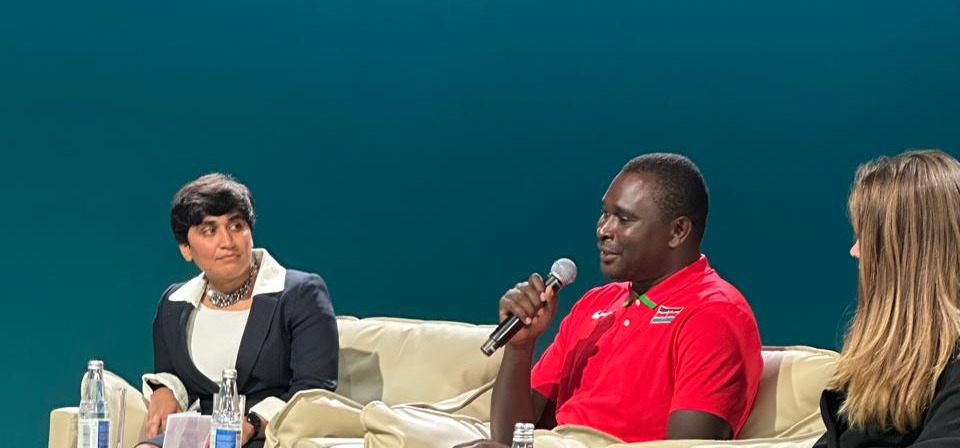
MPs join push for bold action at the climate talks
Negotiations at COP29 have entered the second week.
World Athletics says 75 per cent of athletes have been adversely affected by climate change.
In Summary

Kenya’s world and Olympic record holder in the 800 meters David Rudisha is concerned that the impacts of climate change will deal a major blow to the game he adores.
Rudisha who is also two times Olympic Champion told a panel in Baku, Azerbaijan that climate change has added extra challenge to the performance in athletics.
“High temperatures and air quality directly impact performance both in training and competition. To register the best times in a race, conditions must be perfect, which is rare now with climate change,” Rudisha said.
Rudisha was one of the panelists in the ongoing climate negotiations meant to look for solutions to the impacts of climate change.
The panel was titled ‘Sports for Climate Action: Playing to Win Against Climate Change.’
Athletics Kenya (AK) President Jack Tuwei, Kenya’s Ambassador and Permanent Representative to UNEP and UNON Gertrude Angote, Bernard Ouma from Sports Ministry, Philip Osano from Stockholm Environment Institute, and AK’s Communication and Sustainability Officer Maxwell Nyamu were present.
Rudisha said in order to secure the future of the sport and safeguard athletes, working together is crucial.
“For the long-distance runners that need forested areas to train, it is important to restore these forests so that athletes can train in a conducive environment.”
Rudisha said the increasing levels of air pollution in cities are also affecting young athletes.
We need green belts in cities that can provide young kids with the opportunity to train in areas that are less polluted.
According to World Athletics, 75 per cent of athletes have been adversely affected by climate change.
Seventy-seven are extremely concerned about the future impacts of climate change.
It is for this reason that an initiative known as Sports for Climate Action is being mooted.
The initiative convened by UN Climate Change brings the sports sector together to agree on a common pathway for climate action.
Almost 300 sporting governing organisations, leagues, teams, and clubs have joined the framework, committing to a net-zero, resilient future.
Beyond their own emissions and supply chains, join this event to hear how sports are working with cities, industries, and fans to identify and scale climate solutions in mitigation and adaptation.
The panel discussion dived into the potential for systems transformation through the unique spheres of influence that sport naturally holds—from purchasing goods and services to sponsorships—and will conclude with inspiring athlete voices on how sport can become a force for good in addressing climate issues.
Rudisha told those in attendance that he comes from the Maasai community in Kenya where nature is embedded in our daily lives as we depend on livestock.
“We live close to the famous Maasai Mara National Reserve which many of you know remains the only place on earth where you still have millions of wildebeests migrating annually from the Serengeti in Tanzania,” Rudisha said.
He said frequent droughts due to climate change have wiped away livestock making many people poor in my community.
“Wildlife have also died from droughts affecting tourism from where many people derive incomes. Also, as a kid, we used to train in the forested areas but over the years, I have seen many of these forests disappear.”
Rudisha said he is concerned as kids from his community no longer have forests to train.
“If we do not take action, they may not have the opportunity to reach my achievement as a double Olympics, double World, double diamond league and world record holder in 800m,” he said.
Tuwei said when they were hosting the World Under 20, they were the first federation to sign the UN Sports for Climate Action Framework out of 214 member federations in the world.
“With that commitment, Athletics Kenya became, the first federation globally in athletics to sign and commit to the framework and to deliver on the five principles of the framework,” Tuwei said.
Tuwei said they have been able to work with the support of UNEP, the Regional Office for Africa, and the Stockholm Environment Institute in undertaking the responsibilities under the framework.
Tuwei said a lot of work has since been undertaken including tree growing, and the incorporation of sustainability initiatives around sports for climate action through the support of UNEP and Stockholm Environment Institute.
He said they have been able to install air quality monitors in Kenya in a number of sports venues and even across Africa.
In Kenya, we have air quality monitors in Kasarani, Nyayo National Stadium, Nakuru Athletics Club, among others.

Negotiations at COP29 have entered the second week.